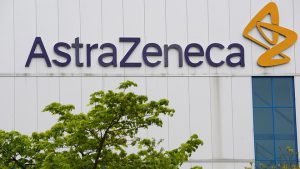Latest news on the search for a vaccine against the new coronavirus
By Annelies Gartner ; Lizzie Roberts and Christopher Hope, Chief Political Correspondent 18 June 2020 • 12:34am
Alok Sharma, the Business Secretary, said that the clinical trial at the University of Oxford is progressing well and, if it proves successful, the doses could be ready by the end of the summer.
He said he was “very proud” of how quickly British scientists and researchers have “come together in their efforts developing a vaccine”.
Mr Sharma announced a further £84 million in funding to accelerate the work currently under way at Oxford and Imperial College.
The eyes of the nation – and perhaps the world – are firmly upon Professor Adrian Hill and his team at Oxford University.
Last month, the pharmaceutical giant AstraZeneca announced a $1.2 billion deal with the US government to produce 400 million doses of the unproven coronavirus vaccine first produced in Prof Hill’s Oxford lab.
On June 13, AstraZeneca Plc signed a contract with European governments to supply up to 400 million doses of the vaccine. Meanwhile, the British Government has agreed to pay for up to 100 million doses, adding that 30 million may be ready for UK citizens by September.
The stakes could hardly be higher. If proven effective, the ZD1222 vaccine would allow people to leave their homes, go back to work, and rebuild the economy.
But the Government has also cautioned that an effective coronavirus vaccine may never be found.
In a foreword to the Government’s strategy to ease lockdown, the Prime Minister said that the “only feasible long-term solution” to end the coronavirus pandemic is the creation of an effective vaccine or treatment, but warned this was not an inevitability.
The Government’s chief scientific adviser, Sir Patrick Vallance, said the development of an effective vaccine could never be guaranteed.
Meanwhile, the UK’s first dedicated vaccine-making facility is building capacity to produce “tens of millions” of doses to guard against coronavirus, and the first coronavirus antibody test has been approved by Public Health England.
Clinical teams at the University of Oxford’s Jenner Institute and Oxford Vaccine Group began work in January to develop a Covid-19 vaccine.
The team progressed to human trials on April 23, and a study involving up to 510 healthy volunteers between 18 and 55 is now under way in Oxford and Southampton, with three further sites likely to be added.
Scientists working on the vaccine have said they could know within six weeks whether it will work.
Sir John Bell, Regius Professor of Medicine at Oxford University, said “several hundred” Britons have now been given the experimental jab, with hopes that “signals” about whether it works could emerge by mid-June.
The UK will join only the US – with two studies – and China, in beginning human trials.
It was revealed on that the Oxford University vaccine trial is heading into hospitals amid fears that Covid-19 is not prevalent enough in wider society.
After announcing the further £84 million in new funding Mr Sharma said: “This new money will help mass-produce the Oxford vaccine so that if current trials are successful we have dosages to start vaccinating the UK population straight away.”
He said pharmaceutical firm AstraZeneca had finalised a “global licensing agreement” with Oxford University with Government support, adding: “This means that if the vaccine is successful AstraZeneca will work to make 30 million doses available by September for the UK as part of an agreement for over 100 million doses in total.”
Mr Sharma added “the UK will be first to get access” but that the Government would also ensure that “we’re able to make the vaccine available to developing countries at the lowest possible cost”.
Matt Hancock, the Health Secretary, has said, if successful, the first 30 million vaccines will be “at the start for the most vulnerable”.
Mr Hancock told MPs in the Commons: “… if it does (work) it is likely to be one of the first available in the world, then we have agreement to make sure that 100 million doses are available for the UK, the first 30 million of which will be right at the start for the most vulnerable.
“That is a UK-wide policy, we’ll deliver it right across these islands.”
He added: “Vaccine science is an uncertain business, that is why we cannot ever be 100 per cent sure that there will be a safe and effective vaccine.
“But we’re putting everything we possibly can into making sure that we can give them the best possible chance for every citizen of the whole United Kingdom.”
On the partnership with AstraZeneca, Sir John said: “Once we get an approval by the regulators we don’t want to have to go back to the beginning and work out how we manufacture it at scale.
“We also want to make sure that the rest of the world will be ready to make this vaccine at scale so that it gets to populations in developing countries, for example, where the need is very great.
“We really need a partner to do that and that partner has a big job in the UK because our manufacturing capacity in the UK for vaccines isn’t where it needs to be, and so we are going to work together with AstraZeneca to improve that considerably.”
Researchers at Imperial College London will begin clinical trials in 300 people this week, to see whether their jab produces an effective immune response against Covid-19.
The healthy participants, aged between 18 and 70, will all receive two doses of the vaccine over the coming weeks, and the hopes are that tests could then move on to 6,000 volunteers if they are successful.
Rather than giving people a weakened form of the illness, the Imperial vaccine instead uses synthetic strands of genetic code based on the virus’ genetic material.
The research has been funded by £41m from the UK Government, as well as £5m of other donations.
The work has been praised by Mr Sharma, who said: “The fast progress of Imperial’s vaccine is testament to the ingenuity and tenacity of Britain’s researchers.
“If these trials are successful a vaccine will not only help us tackle coronavirus but also emerging diseases now and into the future.”
Route to treatment and how they work
What’s the latest on the Oxford route?
Until last month, the Oxford vaccine was considered the clear frontrunner in the global race. However, a widely-reported article in Forbes cast doubt on the results of the trial, suggesting that results actually showed the vaccine did not prevent the animals from catching or spreading the virus because traces were found in the creatures’ noses.
The vaccine was tested at the National Institute of Health’s Rocky Mountain Laboratory in Montana on rhesus macaque monkeys who are thought to have similar immune systems to humans.
“All of the vaccinated monkeys treated with the Oxford vaccine became infected when challenged as judged by recovery of virus genomic RNA from nasal secretions,” said Dr William Haseltine, a former Harvard Medical School professor who had a pivotal role in the development of early HIV/Aids treatments.
“There was no difference in the amount of viral RNA detected from this site in the vaccinated monkeys as compared to the unvaccinated animals. Which is to say, all vaccinated animals were infected,” Dr Haseltine wrote in the article on Forbes.
But Professor Hill, director of the university’s Jenner Institute, said the article was misleading because the monkeys had been deliberately “overdosed” on coronavirus in order to test for safety.
“The honest truth, I think, is that the author is a long-retired senior Harvard virologist, infectious disease guy. He’s not a vaccine developer,” he said.
“We used a really high dose and these guys gave it not just into the lungs and the nose. They gave it into the mouth, and they gave it into the eyes. They gave a huge dose. I mean, seriously, it’s that level of basic.”
Even so, Prof Hill accepts the chances of success still hang firmly in the balance.
“The US government, the UK government, loads of charities and philanthropists are all saying we’ll pay to have it manufactured, before you finish the trial. I mean, it’s a huge kind of vote of confidence in what we’re doing. It’s really flattering,” he said.
“But that doesn’t guarantee the result. It could be nothing or could be great or somewhere in between.”
Elsewhere researchers at Imperial have developed a candidate which, when injected, will deliver the genetic instructions to muscle cells to make the SARS-CoV-2 spike surface protein.
This should provoke an immune response and create immunity to the virus.
The team, led by Professor Robin Shattock from Imperial’s Department of Infectious Disease, has been testing the candidate in animals since early February.
The Business Secretary said that Imperial College London was “making good progress” and would look to move into clinical trials for a vaccine by mid-June, with larger scale trials in October.
The trial is not yet open to recruitment, but will be announced in due course.
Dr Katrina Pollock, Clinical Research Fellow in Vaccinology, who will be leading the work at Imperial’s Hammersmith campus, said: “This is the first-in human trial for this candidate vaccine and an important step towards developing a safe and effective vaccine against the novel coronavirus.
“Our clinical team is excited to begin trials as a key centre in this landmark study to combat Covid-19.”
Human trials in the US
In the United States a vaccine trial is showing promising early results, after the candidate reportedly produced protective antibodies in a small group of healthy volunteers.
Neutralising antibodies were found in the eight people took part in the safety trials for the mRNA-1273 vaccine, which was could train the immune system to fight coronavirus, according to US scientists.
The drug, being tested by firm Moderna, injects a small sample of Covid-19’s genetic code into patients.
The amount is enough to encourage a response from the immune system and the trials are expected to be rolled out more widely in the summer.
Tal Zaks, chief medical officer at Moderna, said: “These interim Phase 1 data, while early, demonstrate that vaccination with mRNA-1273 elicits an immune response of the magnitude caused by natural infection starting with a dose as low as 25 micrograms.”
He added: “These data substantiate our belief that mRNA-1273 has the potential to prevent Covid-19 disease and advance our ability to select a dose for pivotal trials.”
The findings, led by the National Institutes of Health, have not been peer-reviewed or published, but Professor Robin Shattock, Professor of Mucosal Infection and Immunity, Imperial College London, called the early results “encouraging”.
He added: “This is a promising start, but efficacy data will be key followed by an ability to scale in a manner that provides global access should this vaccine be successful.”
A second phase of trials with around 600 people will begin soon, while a third involving thousands of people will start in July. Even if the coming trials are successful Moderna’s vaccine would not be available until between January and June 2021.
US president, Donald Trump, has said the US would start mass production of any vaccines developed before they are fully approved so that they can be quickly distributed once rubber-stamped.
Alongside vaccine development, doctors are trialling existing drugs for viruses such as Ebola, malaria and HIV. Early results seem promising but, until full clinical trials have been concluded, doctors cannot be certain that the drugs are effective.
The Oxford University-led trial of hydroxychloroquine, originally a malaria drug, was hailed by Matt Hancock, the Health Secretary, in April as a “major milestone” in the battle against Covid-19.
However, the results of an international study by the WHO, published last week, indicate that it increases the chances of death for hospitalised patients by nine to 21 per cent.
The organisation suspended its trial on Monday 25 May, citing safety concerns. But on Tuesday 26 May, the leaders of the Oxford-led Recovery trial, which operates in NHS hospitals, said they would continue on the basis their data did not show an increased risk.
It has also been reported that GSK and Sanofi have teamed up to develop a coronavirus treatment, and plan to have a vaccine ready for testing by the end of 2020.
Germany announced it will invest €300m (£269m) in a private biotech firm on the brink of clinical trials for a coronavirus vaccine.
Its purchase of a 23pc stake in CureVac comes after reported attempts by the Trump administration to court the firm and secure supply of any future vaccine sparked political backlash in Berlin. CureVac rejected claims in March that it had received acquisition offers for the company or its technology.
On June 17, a Chinese drug company has announced positive early results of a vaccine, claiming it induced an immune response in 100 per cent of those who were given it.
The vaccine is being developed by the firm China National Biotec Group (CNBG) and is one of the frontrunners among more than 200 other candidates in the race to develop an effective inoculation against the disease.
Chinese biotech, Sinovac, also announced positive results for its coronavirus vaccine, saying it was hoping to move to large-scale phase three trials in Brazil soon.
Dexamethasone breakthrough
The world’s first coronavirus treatment that significantly reduces the risk of death is being given to NHS patients following groundbreaking trials by British scientists.
In a breakthrough described by Boris Johnson, the Prime Minister, as a “remarkable achievement”, the common steroid dexamethasone was shown to radically improve the chances of survival for the most ill patients.
On June 16, Mr Johnson hailed the result as the “biggest breakthrough yet” in the treatment of coronavirus, both in Britain and globally.
The Government has been stockpiling dexamethasone since March in case the trials were successful. There are already supplies for 200,000 patients, and enough to cope with any second wave of the virus.
The drug – commonly used to treat arthritis, severe allergies and asthma – costs just £5 for a full course of treatment and is expected to have a major impact on the pandemic.
Scientists at Oxford University, who have been conducting trials on a number of drugs since March, announced that a 10-day course of dexamethasone lowers the risk of death for people on ventilators by one third.
The researchers said the drug should become the standard of care in the most sick patients.
UK vaccine taskforce
On April 17, the government launched a taskforce designed to “rapidly develop a coronavirus vaccine”, as well as scale up manufacturing so it can be quickly produced and delivered in mass quantities.
It is led by Sir Patrick Vallance and Professor Jonathan van Tam, the deputy chief medical officer, and members will include AstraZeneca and the Wellcome Trust.
The government has initially earmarked £14 million to plough into 21 coronavirus research projects – such as the work by the scientists at the University of Oxford and Imperial College London. On April 21, an announcement of a further £44.5 million for the Oxford and Imperial trials increased this funding further still.
A few weeks later the Business Secretary, Alok Sharma announced a further £84 million in new funding “to help accelerate their work”.
He said: “This new money will help mass-produce the Oxford vaccine so that if current trials are successful we have dosages to start vaccinating the UK population straight away.”
To help the UK mass produce a vaccine, Mr Sharma has announced the UK’s first vaccines manufacturing innovation centre is expected to open in summer 2021, a year ahead of schedule.
He said: “To further support our domestic manufacturing capabilities last month, I announced the Government would accelerate building the UK’s first vaccines manufacturing innovation centre, which is based at Harwell in Oxfordshire.
“And today I can announce we will invest up to a further £93 million in the centre ensuring that it opens in summer 2021, a full 12 months ahead of schedule. “The centre, which is already under construction, will have capacity to produce enough vaccine doses to serve the entire UK population in as little as six months.”
How long does it take to make a vaccine and why?
One crucial advance aiding vaccine research is the development of an organisation called the Coalition for Epidemic Preparedness Innovations (CEPI), set up in response to the lack of scientific progress when Ebola ripped through West Africa in 2014 to 2016.
CEPI’s mission is to rapidly respond to epidemics by providing the money to researchers to develop vaccines.
CEPI is already developing at least eight potential vaccines for Covid-19, and in January announced that a vaccine for Covid-19 would be ready for testing by the end of May.
Researchers are confident they’ll have at least one vaccine ready within 18 months. That would be the fastest humans have ever gone from seeing a brand new pathogen to developing a vaccine against it.
However, Sir Patrick Vallance – the chief scientific adviser – has moved to temper public expectations, saying: “All new vaccines that come into development are long shots. Only some end up successful. Coronavirus will be no different and presents new challenges. This will take time.”
The biggest hurdle for vaccine development is manufacture and distribution at scale – it is estimated that CEPI needs at least another $2 billion in funding. The UK has already committed £250 million of aid to CEPI, the biggest donation of any country.
Health experts have warned that the virus could hit Britain in “multiple waves”, which has led to fears that some vaccines might not work on mutated strains. But Prof Pollard said it is “not surprising” to see mutations in the virus due to its genetic makeup.
He added: “So far, there haven’t been new viruses emerging, which are unable to be prevented by the types of immune responses that we expect to be generated by the vaccines being developed.”
Ramin Sarajari:
This is a wonderful news and we all hope to have this vaccine as early as possible. The impact of this virus is beyond our imagination but there is a new world order and we must accept the situation.




